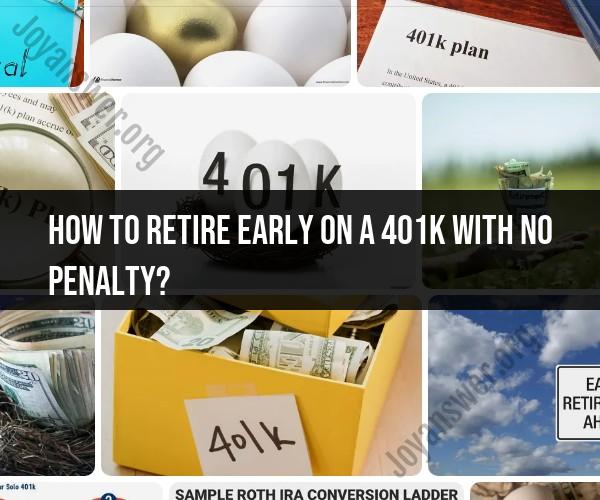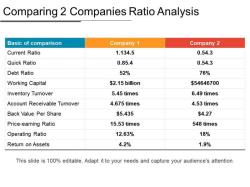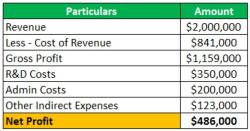How to retire early on a 401k with no penalty?
Retiring early and accessing your 401(k) savings without penalties typically involves careful planning and adherence to certain rules and strategies. Here are some strategies to retire early with a 401(k) without incurring penalties:
Reach the Appropriate Age:
- The most straightforward way to avoid early withdrawal penalties is to wait until you reach the age at which you can access your 401(k) without penalties. For traditional 401(k) plans, this age is typically 59½.
Utilize Substantially Equal Periodic Payments (SEPP):
- The IRS allows you to make early withdrawals from your 401(k) without penalties through a process called Substantially Equal Periodic Payments (SEPP) or 72(t) distributions. Under SEPP, you can take a series of substantially equal withdrawals based on your life expectancy, and these withdrawals are exempt from the 10% early withdrawal penalty. However, you must follow specific IRS guidelines, and once you start SEPP, you must continue for five years or until you reach age 59½, whichever is longer.
Consider a Roth 401(k):
- Contributions to a Roth 401(k) are made with after-tax dollars, which means you've already paid taxes on the contributions. You can withdraw your contributions (not earnings) from a Roth 401(k) at any time without penalties or taxes. However, to withdraw earnings penalty-free, you generally need to wait until age 59½ and have held the account for at least five years.
Rule of 55 (For Separation from Service):
- If you separate from service with your employer in or after the year you turn 55 (or 50 in some cases), you can take penalty-free withdrawals from your 401(k) plan associated with that specific employer. This option is available even if you are under 59½.
Use a Roth IRA Conversion Ladder:
- This strategy involves rolling over funds from your traditional 401(k) into a Roth IRA gradually. After five years, you can withdraw the converted funds without penalties, regardless of your age. However, you will need to pay income taxes on the converted amount.
Plan for Health Insurance:
- Early retirees often need to address health insurance coverage before Medicare eligibility at age 65. Explore health insurance options, such as COBRA, ACA marketplace plans, or employer-sponsored retiree health insurance, to bridge the gap.
Consult a Financial Advisor or Tax Professional:
- Early retirement planning can be complex due to the various rules and tax implications. It's advisable to consult with a financial advisor or tax professional who specializes in retirement planning to create a customized strategy that aligns with your goals and financial situation.
Keep in mind that while these strategies can help you avoid the 10% early withdrawal penalty, you will still need to pay income taxes on any distributions from traditional 401(k) accounts, except for qualified Roth 401(k) withdrawals. The specific rules and options can vary depending on your individual circumstances, so professional guidance is often crucial when planning for early retirement.
Early Retirement and 401(k): Penalty-Free Strategies
If you are thinking about retiring early, it is important to plan carefully so that you can avoid paying any unnecessary penalties on your 401(k) withdrawals. There are a few different strategies that you can use to withdraw money from your 401(k) penalty-free before age 59½.
Substantially equal periodic payments (SEPP)
One strategy is to take substantially equal periodic payments (SEPPs). SEPPs allow you to withdraw money from your 401(k) penalty-free over a period of at least five years. The amount of each payment is calculated based on your age and the balance of your 401(k) account.
72(t) distributions
Another strategy is to take 72(t) distributions. 72(t) distributions allow you to withdraw money from your 401(k) penalty-free without having to take SEPPs. However, there are a few restrictions on 72(t) distributions. For example, you must withdraw money from your 401(k) for at least five years, and you must start withdrawing money before age 59½.
Rule of 55
If you are age 55 or older and you leave your job, you may be able to withdraw money from your 401(k) penalty-free without having to take SEPPs or 72(t) distributions. However, you will still be subject to income taxes on the money you withdraw.
Retiring Early Using Your 401(k) Without Penalties
If you are considering retiring early, it is important to talk to a financial advisor to develop a plan for withdrawing money from your 401(k) penalty-free. A financial advisor can help you to choose the best strategy for your individual needs and to avoid paying any unnecessary penalties.
401(k) and Early Retirement: Financial Planning Tips
Here are a few financial planning tips for early retirement:
- Start saving early. The earlier you start saving for retirement, the more time your money has to grow.
- Make regular contributions to your 401(k). Try to contribute at least the amount that your employer will match.
- Invest your 401(k) wisely. Choose investments that are appropriate for your age, risk tolerance, and time horizon.
- Consider using a Roth 401(k). With a Roth 401(k), you pay taxes on your contributions now, but you can withdraw your money tax-free in retirement.
- Create a retirement budget. This will help you to determine how much money you will need to live comfortably in retirement.
- Review your retirement plan regularly. As your circumstances change, you may need to adjust your plan.
Retiring early can be a great way to enjoy your life to the fullest. However, it is important to plan carefully so that you can afford to retire early and live comfortably.













